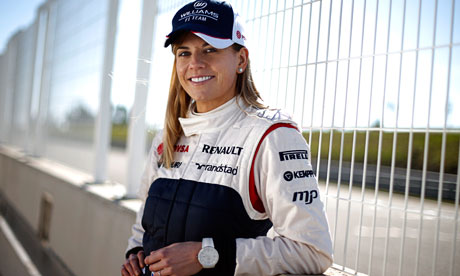
‘Men are much more egotistical. But that means women can accept criticism and improve easier than men can,’ says Susie Wolff, the Williams F1 test driver. Photograph: Williams F1/PA Wire/Press Association Images
It was 100 years ago this week that the suffragette Emily Davison threw herself under the trampling hooves of George V’s horse, Anmer, at the Derby to draw attention to her campaign. Susie Wolff, though, has no need to fling herself under a thundering Red Bull, Ferrari or McLaren at Hangar Straight or Stowe at Silverstone in four weeks’ time; bright-eyed and articulate, she makes the case for her gender in Formula One with such conviction that one is tempted to give her the vote immediately.
Wolff has already moved through motorsport, through karting, Formula Renault, Formula Three and DTM, where she competed strongly for seven years, in a way that would suggest that she is something more than a novelty. Today, she is the only woman at the wheel in Formula One: she works as a test driver for Williams, still one of the most evocative names in F1 despite their current travails. She also fills an ambassadorial role.
So can Wolff ultimately make it on to the grid for an actual Formula One race? History would suggest not. If a woman were going to make it into Formula One proper it would probably have happened by now –the Formula One world championship started in 1950.
Women simply aren’t physically strong enough, is the view in the paddock. F1 drivers, though often built like jockeys, are often immensely strong; little Lewis Hamilton has a handshake that can take your arm off at the shoulder. Wolff, understandably, is not convinced. “Look at the size of Sebastian Vettel,” she says. “Do you see a big, muscular guy? I know women have 30% less muscle than men. And in DTM [German touring cars] I had to train harder. But I was karting from such a young age that, year on year, my body was getting stronger in the right places.”
Sir Stirling Moss got himself into terrible trouble recently when he claimed that women did not have the mental strength to compete in Formula One. “Stirling called and left a message for me to call back urgently. I said I appreciated him calling. But I told him that there was no need for him to apologise.
“If that was his opinion, I said, there was no problem for me. But he said his opinion was taken out of context. He said he had a lot of respect for me, because I was willing to get in that car and drive it. And he did say he thought I could do it. What he said was that women in general did not have the same mental aptitude for driving as men do.”
But didn’t that old dinosaur have a point? Women road drivers are always claiming that they are safer, that they have fewer serious accidents and that, as a consequence, their insurance premiums are often lower. Men, in general, are faster, more competitive, aggressive and ego-driven, and while that isn’t particularly helpful as you make your way up the M1 those factors might be considered attributes in the world of Formula One. But Wolff is right there in your wing mirror when she says: “It’s not a gender thing. You can pick anyone off the street and it depends on his or her own character how they can drive a car.
“Men are much more egotistical. But that means women can accept criticism and improve easier than men can. Women can stay concentrated and can multi-task more easily [no trifling point with more than 50 controls in the modern F1 car]. But it also comes down to character. You can’t generalise what a female can do better than a man.
“I was asked to do some studies to see if I was different. And I do have more male testosterone than the average woman does. Whether that makes me more aggressive, I don’t know. But I have that. It comes down to character. I was racing at eight with little boys who were super aggressive. I couldn’t have held my own at that age if I didn’t have something in me which was also aggressive.”
There is no doubt that her childhood in Scotland helped her, as did having a brother, David, who was 18 months older. “My parents didn’t differentiate between me and David. It was never a case of saying David’s doing that, you go play with dolls. I was always encouraged to do what I enjoyed doing.
“My dad has a motorbike dealership in the West Highlands. My mum met him when she went to buy her first motorbike, so I think it’s in the blood. We always used to follow my dad around when he was racing. We had our own little motorbikes. And then he bought my brother and I a kart and that’s how it started.
“I was always a very competitive little kid. I did swimming very competitively, downhill skiing very competitively. Everything was competition. And I always enjoyed karting the most because of the speed, and there was that adrenalin. At that age you don’t think of a career.
“It wasn’t until I was 14 and taken to watch a Formula Three race, which [McLaren's] Jenson Button won, that I said to myself: ‘Wow, I can actually do this as a career.’ And that’s when the switch happened in my head.”
So can the switch happen from driving simulators for Williams to actually racing in Formula One? “I’m very aware that I have to perform. But I wouldn’t be here if I didn’t think I was quick enough.
“The ambition is to be at the top of this sport. But I said as soon as I joined Williams that I’m not going to run before I can walk. But I’ve applied for my Super licence [to drive in F1]. I’m trying to get more track time. What I fear happening is an opportunity coming and not being ready for it. Because that opportunity will only ever come once. And if you’re not good enough you are never going to get it back again. Formula One is so competitive. That chance only comes once and you have to make the most of it.”
Susie Wolff, one senses, will be ready for it.
 Cheyenne Woods at the U.S. Women’s Open golf tournament in 2012. (AP)Not a hard-hitting question, but it came from a member of the media Woods knows quite well: his niece, Cheyenne Woods.
Cheyenne Woods at the U.S. Women’s Open golf tournament in 2012. (AP)Not a hard-hitting question, but it came from a member of the media Woods knows quite well: his niece, Cheyenne Woods. 















